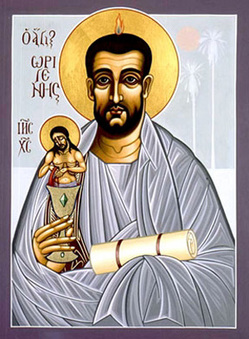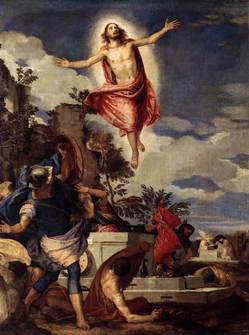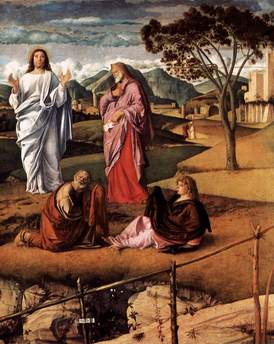
Recently in Church Fathers & Mothers Category

 If [God] had no need of the flesh, why did He heal it? And what is most forcible of all, He raised the dead. Why? Was it not to show what the resurrection should be? How then did He raise the dead? Their souls or their bodies? Manifestly both. If the resurrection were only spiritual, it was requisite that He, in raising the dead, should show the body lying apart by itself, and the soul living apart by itself. But now He did not do so, but raised the body, confirming in it the promise of life. Why did He rise in the flesh in which He suffered, unless to show the resurrection of the flesh? And wishing to confirm this, when His disciples did not know whether to believe He had truly risen in the body, and were looking upon Him and doubting, He said to them, "Ye have not yet faith, see that it is I"; and He let them handle Him, and showed them the prints of the nails in His hands. And when they were by every kind of proof persuaded that it was Himself, and in the body, they asked Him to eat with them, that they might thus still more accurately ascertain that He had in verity risen bodily; and He did eat honey-comb and fish. And when He had thus shown them that there is truly a resurrection of the flesh, wishing to show them this also, that it is not impossible for flesh to ascend into heaven (as He had said that our dwelling-place is in heaven), "He was taken up into heaven while they beheld," as He was in the flesh. If, therefore, after all that has been said, any one demand demonstration of the resurrection, he is in no respect different from the Sadducees, since the resurrection of the flesh is the power of God, and, being above all reasoning, is established by faith, and seen in works.
If [God] had no need of the flesh, why did He heal it? And what is most forcible of all, He raised the dead. Why? Was it not to show what the resurrection should be? How then did He raise the dead? Their souls or their bodies? Manifestly both. If the resurrection were only spiritual, it was requisite that He, in raising the dead, should show the body lying apart by itself, and the soul living apart by itself. But now He did not do so, but raised the body, confirming in it the promise of life. Why did He rise in the flesh in which He suffered, unless to show the resurrection of the flesh? And wishing to confirm this, when His disciples did not know whether to believe He had truly risen in the body, and were looking upon Him and doubting, He said to them, "Ye have not yet faith, see that it is I"; and He let them handle Him, and showed them the prints of the nails in His hands. And when they were by every kind of proof persuaded that it was Himself, and in the body, they asked Him to eat with them, that they might thus still more accurately ascertain that He had in verity risen bodily; and He did eat honey-comb and fish. And when He had thus shown them that there is truly a resurrection of the flesh, wishing to show them this also, that it is not impossible for flesh to ascend into heaven (as He had said that our dwelling-place is in heaven), "He was taken up into heaven while they beheld," as He was in the flesh. If, therefore, after all that has been said, any one demand demonstration of the resurrection, he is in no respect different from the Sadducees, since the resurrection of the flesh is the power of God, and, being above all reasoning, is established by faith, and seen in works.
Saint Justin Martyr, before A.D. 165, from some lost fragments on the Ressurection
One can distinguish five reasons why God allows the devil to attack us:
first, so that from attack and counter-attack we may become practiced in discerning good from evil;
second, so that our virtue may be maintained in the heat of the struggle and so be confirmed in an impregnable position;
third, so that as we advance in virtue we may avoid presumption and learn humility;
fourth, to inspire in us an unreserved hatred for evil through the experience we thus have of it;
fifth, and above all, that we may attain inner freedom and remain convinced both of our own weakness and of the strength of him who has come to our aid.
Maximus the Confessor (580-682)
Centuries on Charity 2, 67 (Sources Chrétiennes 9, p. 114)
"I am the victim of violence in my nature," you say. "I love Christ, yet my nature compels me to sin."
If you were in fact compelled to sin, if you were the victim of violence, then you would be forgiven for it. On the other hand, if you sin through idleness, do not expect forgiveness.
But let us look at the question a moment to discover if we do commit sins by compulsion, under pressure of violence, rather than through idleness or serious negligence.
It is written: "Thou shalt not kill."
But who compels you to kill? Who forces you to do it? On the contrary, you have to do violence to your own nature to kill someone. Which of us would light-heartedly cut a neighbor's throat? Who would gladly stain his hands with blood? No one. So the facts are the exact opposite of your contention. To sin, you have to force yourself.
God has given our nature the gift of mutual love as a result of which every living creature loves its own kind, every human being loves his neighbor. Do you see? Our nature predisposes us to virtue. It is vices that are contrary to nature. If they win a victory, it is the fault of series negligence on our part.
And adultery, what shall we say about that? What sort of necessity drives you to that?
Your answer: "The tyranny of desire."
Why, I ask you? Can you not have intercourse with your spouse and in this way defeat that tyranny? "But I am in love someone else's spouse." In this case there is no compulsion. Love cannot be compelled. You do not love because you are forced to love: you love spontaneously, of your own free will. Sexual intercourse spontaneously, of your own free will. Sexual intercourse may be an irresistible need, but love is a free choice.
The conclusion is clearly apparently: virtue is consistent with our nature whereas vice is opposed to it.
Saint John Chrysostom
On the Letter to the Ephesians 2, 3 (PG 62, 20)
Why does error have a free rein and why does God allow the wicked to disturb the existence of so many people?
First of all, before trying to understand, we need to put ourselves in front of the incomprehensible wisdom of God. One who is firmly anchored in God does not suffer any loss, even if attacked by a thousand waves and a thousand storms. On the contrary, he emerges stronger.
There is a reason, however, which I can venture to suggest.
In the first place, scandals are permitted so that the rewards of the righteous may not be diminished. That is why God said to Job: "Do you not understand that I have treated you in this fashion so that righteousness may be made manifest?" [Job 40:8]
But there is a another reason why the wicked are left at large: so that they may not be deprived of the advantages of conversion from their evil ways, which certainly could not happen if they had been rendered incapable of doing evil. In this way,
You may speak to me about those who have been scandalized. Well and good. But I then speak to you about those who have benefited from the scandal by winning glory, and I repeat my point: the existence of careless and lazy people would not justify leaving in a state of inferiority keen and wide-awake people who are capable of richly deserving their eternal recompense. A great wrong would be done to them if they were not given the chance to strive.
On
(SC 79, pp 183ff.)
 "What does it mean to say: He was transfigured?" asks the Golden-Mouthed Theologian (Chrysostom). He answers this by saying: "It revealed something of His Divinity to them, as much and insofar as they were able to apprehend it, and it showed the indwelling of God within Him." The Evangelist Luke says: "And as He prayed, His countenance was altered" (Luke
"What does it mean to say: He was transfigured?" asks the Golden-Mouthed Theologian (Chrysostom). He answers this by saying: "It revealed something of His Divinity to them, as much and insofar as they were able to apprehend it, and it showed the indwelling of God within Him." The Evangelist Luke says: "And as He prayed, His countenance was altered" (Luke
O God, You commanded us to listen to Your beloved Son, deign to nourish us interiorly by Your word, so that, with our spiritual view having been purified, we may rejoice in the Presence of Your glory.
 Question: How can a person know that his prayer is acceptable to God? (1 Pt 2:5)
Question: How can a person know that his prayer is acceptable to God? (1 Pt 2:5)
Answer: When a person makes sure that he does not wrong his neighbor in any way whatsover, then let him be sure that his prayer is acceptable to God (see Ex 20:16-7; Mt 19:19). But if someone harms his neighbor in any way whatsoever, either physically or spiritually, his prayer is an abomination and is unacceptable. For the wailing of the one who is being wronged will never allow this person's prayer to come before the face of God. And if indeed he does not quickly reconcile with his neighbor, he will certainly not go unpunished his whole life by his own sins, for it is written that whatever you bind on earth will be bound in heaven (Mt 18:18).
Tim Vivian, ed., Becoming Fire: Through the Year with the Desert Fathers and Mothers. (Collegeville: Cistercian Studies, 2008).
Abba Antony said, 'I saw the snares that the Enemy spreads out over the world and, groaning, I said, "What can get through such snares?" Then I heard a voice saying to me, "Humility.'"
Tim Vivian, ed., Becoming Fire: Through the Year with the Desert Fathers and Mothers. (Collegeville: Cistercian Studies, 2008).


